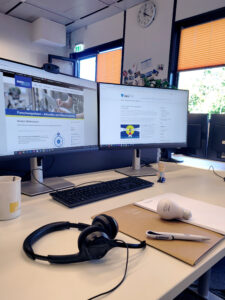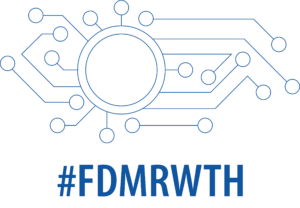All good things come in three. After we already reported on the cross-site morning programme and the RWTH’s workshop offer on the RDM platform Coscine, this is the third follow-up report on the Research Data Day in NRW, which was held on November 15, 2022 under the motto “Lighthouse RDM: Orientation in the Sea of Data”.
Anchors aweigh – We cast off
At 2pm it was time to “cast off” for the RWTH University. The information and networking event “RDM Compass – the RWTH ship on NFDI course” started with a welcome by the new Head of the University Library, Dr Jochen Johannsen.
Then Cord Wiljes from the NFDI took the helm and spoke about the interdisciplinary development of the NFDI.
He emphasised that their broad and partly interdisciplinary orientation could already be seen in the names of the consortia. All consortia are interlinked, have overlaps and work on common topics. This is supported by sections in which the cross-sectional topics are worked on across the boundaries of the consortia.
Another aspect of interdisciplinary development is the promotion of the Base4NFDI basic services consortium. The initiative develops services that cannot be provided NFDI-wide by individual consortia, but are needed by many. The needs assessment and identification of potential basic services are carried out via the NFDI sections.
The lighthouse as orientation in the open sea of data – The consortia’s flash talks
Next, NFDI stakeholders from the RWTH presented their specific work priorities within the consortia as flash talks in one of the three separate sessions.
In the first session, there were four presentations on the topic of “Metadata, Ontologies and Standards”. The session started with a contribution from NFDI4Objects. Here the three points for the RWTH were presented: Collaboration in the consortium, collaboration in the sections and the subject-specific research portal baureka.online. Interestingly, there are four consortia in the humanities.
An actor from the MatWerk consortium illustrated the FAIR Digital Objects (DO) and first gave insights into the work of a Data Scientist. Participants were informed that cleaning data should be changed to working with data. One way to do this is through FAIR Digital Objects, which roughly speaking consist of a set of links. It was also shown how Coscine and Jupyter Notebooks use the FAIR DO.
In the third Flashtalk, information was given about the work of NFDI4Chem on journal requirements. Here it became clear how quickly content can change. Many journals adapt their requirements with regard to data publication and the statements on the findability of the data.
Afterwards, the NFDI4Energy participants learned more about the role of synthetic and real data in energy research and how to build a FAIR ecosystem for energy research. In addition to industry and the community, social and political aspects must also be taken into account. The participants also got a first insight into the Open Energy Data Platform.
The second session, “Training and Awareness”, included presentations by two consortia that have chosen very different approaches to promote research data management (RDM), FAIR Data and data literacy in their community.
NFDI4Earth relies on the NFDI4Earth Academy to empower selected PhD students and postdocs, who must apply for admission to the two-year programme, with professional RDM and implementation of FAIR principles in the Earth Sciences. At the same time, this is intended to create a network for early career scientists at the interface of Earth system research with the data sciences, providing an environment for regular exchange and shaping the future in NFDI4Earth.
NFDI4Chem, on the other hand, takes a very broad approach and addresses researchers at all career levels from undergraduate to professorship and at all levels of RDM, from novice to data steward. The entire data life cycle is covered. The use of electronic lab books, especially the ELN Chemotion favoured in NFDI4Chem, is a particular concern.
The third session was all about “Concepts, Tools and Infrastructures”: The NFDIxCS consortium deals with the special case: software as research data. Software development processes are already well developed and professionalised. However, a key challenge is the executability of the software over long periods of time and across different platforms. The consortium is therefore developing techniques, processes and standards that take contextual factors into account and preserve everything in the form of containers [1].
A use case from fluid mechanics was presented from the NFDI4Ing consortium. Here, large amounts of simulation data are generated that are difficult to transfer and place high demands on the hardware in post-processing. In addition, high-performance computing centres do not offer permanent archiving, which is why the long-term storage of data and results becomes a challenge.
Like NFDI4Ing, NFDI4Cat conducts research that is close to industry and thus of high economic relevance. The consortium aims to develop “digital catalysis”, in which all process steps are digitally documented and ideally controllable. A key insight here is that data management planning and precise workflow analysis are more important than the tools chosen.
The Punch4NFDI consortium plans to build a “FAIR Data Platform” that provides access control, storage and computing power. In addition to the size of the data, the challenge in astronomy is to coordinate different levels of use for different user groups (citizen scientist/hobby astronomers, universities and large research institutions). (*)
The ship’s crew gets to know each other – Science Speeddating
In order to promote the exchange and getting to know each other among the RDM actors at RWTH in the special event for the Open Meeting of the RDM Network, a virtual Science Speeddating was organised in the fourth part of the programme.
For this, the participants were randomly divided into new small groups in a total of four rounds. To help them get started, the groups were given an RDM guiding question to discuss in each round, but they were basically allowed to talk about anything they liked. This resulted in interesting contacts and entertaining conversations.
RDM compass – support offers as a guidance system
At the end of the event, a compact overview of the various support measures and infrastructure offers at RWTH in the field of RDM was given again. In addition to the general advising services, e.g. on the funding application, on data management plans (DMPs) or on the use of the infrastructure, there is a wide range of further training opportunities in the form of Moodle self-study courses and in-depth workshops. It is worth taking a look at the RWTH’s event database.
The centrally provided infrastructure supports the RDM from planning with the Research Data Management Organizer (RDMO), a web tool for creating DMPs, to Coscine for securely storing and archiving research data annotated with metadata, to publishing the data with RWTH Publications.
Learn more
If you have any questions about Research Data Management in general, just contact the IT-ServiceDesk. The RDM team looks forward to hearing from you.
For more information on RDM, please also visit the RWTH web pages.
_______
Responsible for the content of this article are Sophia Nosthoff and Ute Trautwein-Bruns.
Sources:
[1] https://www.docker.com/resources/what-container/
(*) The paragraph was updated on 23.12.2022






Leave a Reply
You must be logged in to post a comment.